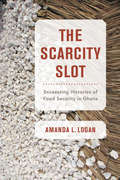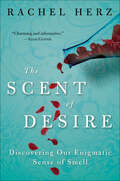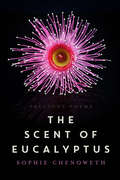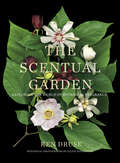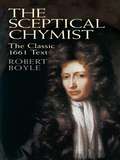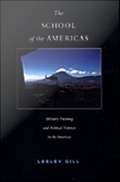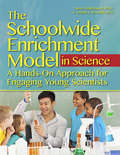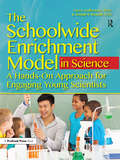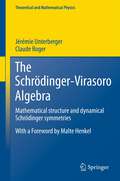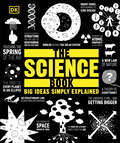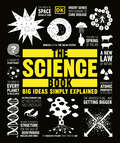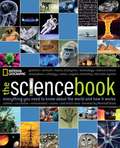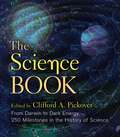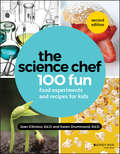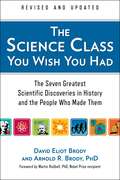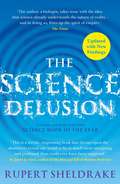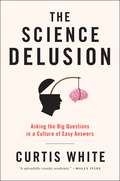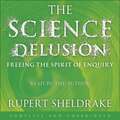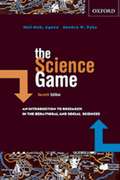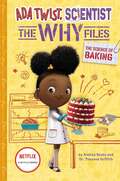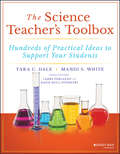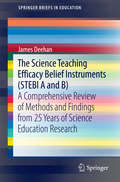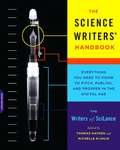- Table View
- List View
The Scarcity Slot: Excavating Histories of Food Security in Ghana (California Studies in Food and Culture #75)
by Amanda L. LoganA free open access ebook is available upon publication. Learn more at www.luminosoa.org.The Scarcity Slot is the first book to critically examine food security in Africa’s deep past. Amanda L. Logan argues that African foodways have been viewed through the lens of ‘the scarcity slot,’ a kind of Othering based on presumed differences in resources. Weaving together archaeological, historical, and environmental data with food ethnography, she advances a new approach to building long-term histories of food security on the continent in order to combat these stereotypes. Focusing on a case study in Banda, Ghana that spans the past six centuries, The Scarcity Slot reveals that people thrived during a severe, centuries-long drought just as Europeans arrived on the coast, with a major decline in food security emerging only recently. This narrative radically challenges how we think about African foodways in the past with major implications for the future.
The Scent of Desire: Discovering Our Enigmatic Sense of Smell
by Rachel HerzThe Scent of Desire explores our sense of smell in a compelling and engaging manner, from emotions and memory to aromatherapy and pheromones.In this first and definitive book on the psychology of smell, neuroscientist Rachel Herz traces the importance of smell in our lives, from nourishment to procreation to our relationships with the people closest to us and the world. Smell was the very first sense to evolve and is located in the same part of the brain that processes emotion, memory, and motivation. To our ancestors, the sense of smell wasn't just important, it was crucial to existence and it remains so today. Our emotional, physical, even sexual lives are profoundly shaped by both our reactions to and interpretations of different smells.Herz examines the role smell plays in our lives, and how this most essential of senses is imperative to our well-being, investigating how our sense of smell functions, what purpose it serves, and shows how inextricably it is linked to our survival. She introduces us to people who have lost their ability to smell and shows how their experiences confirm this sense's importance by illuminating the traumatic effect its loss has on the quality of day-to-day living. Herz illustrates how profoundly scent and the sense of smell affect our daily lives with numerous examples and personal accounts based on her years of research.For anyone who has ever wondered about human nature or been curious about the secrets of both the body and the mind, The Scent of Desire is a fascinating, down-to-earth tour of the psychology and biology of our most neglected sense, the sense of smell.
The Scent of Eucalyptus: Precious Poems
by Sophie ChenowethThis book is an ode to the fragrant, yet rough-hewn Australian bush. By delving into its pages, you will be transported to a parallel realm where flannel flowers sing, cockatoos choreograph and paperbark trees seduce. A memoir of sorts, this poignant and ethereal collection of poems celebrates the beauty, the harshness and the resilience of this ancient land and its unforgettable inhabitants. In addition, you'll be serenaded by harps and fairies, meander through time in a yellow dinghy and stand in quiet awe as a ballerina beguiles. Refreshingly honest, this waltz down memory lane is intensely emotional but has a lightness that will soothe even on the blusteriest of days. Illustrated with sensitively taken photographs, it is a keepsake you will cherish for many years to come.
The Scentual Garden: Exploring the World of Botanical Fragrance
by Ken DruseA complete illustrated survey of fragrant flowers and plants, from a celebrated gardening expert and an award–winning botanical photographer. Popular garden writer Ken Druse offers a complete survey of fragrance in the garden, in a major work filled with new knowledge. He arranges both familiar and unusual garden plants, shrubs, and trees into twelve categories, giving gardeners a vastly expanded palate of scents to explore and enjoy, and he also provides examples of garden designs that offer harmonious scentual delights. Ellen Hoverkamp contributes her artful botanical images of flowers and plants discussed in the text. These are accompanied by Druse’s award-winning garden photographs, to create a book that is as beautiful to look at as it is informative and evocative to read.
The Sceptical Chymist
by Robert BoyleThis classic of scientific reporting by English chemist Robert Boyle, first published in 1661, is the best known of his many works. In this volume, Boyle defines the term "element," asserting that all natural phenomena can be explained by the motion and organization of primary particles. 1911 edition.
The School of the Americas: Military Training and Political Violence in the Americas
by Lesley GillLocated at Fort Benning in Columbus, Georgia, the School of the Americas (soa) is a U. S. Army center that has trained more than sixty thousand soldiers and police, mostly from Latin America, in counterinsurgency and combat-related skills since it was founded in 1946. So widely documented is the participation of the School's graduates in torture, murder, and political repression throughout Latin America that in 2001 the School officially changed its name to the Western Hemisphere Institute for Security Cooperation. Lesley Gill goes behind the faade and presents a comprehensive portrait of the School of the Americas. Talking to a retired Colombian general accused by international human rights organizations of terrible crimes, sitting in on classes, accompanying soa students and their families to an upscale local mall, listening to coca farmers in Colombia and Bolivia, conversing with anti-soa activists in the cramped office of the School of the Americas Watch--Gill exposes the School's institutionalization of state-sponsored violence, the havoc it has wrought in Latin America, and the strategies used by activists seeking to curtail it. Based on her unprecedented level of access to the School of the Americas, Gill describes the School's mission and training methods and reveals how its students, alumni, and officers perceive themselves in relation to the dirty wars that have raged across Latin America. Assessing the School's role in U. S. empire-building, she shows how Latin America's brightest and most ambitious military officers are indoctrinated into a stark good-versus-evil worldview, seduced by consumer society and the "American dream," and enlisted as proxies in Washington's war against drugs and "subversion. "
The Schoolwide Enrichment Model in Science
by Joseph Renzulli Nancy HeilbronnerGrounded in decades of research, the Schoolwide Enrichment Model (SEM) has been successfully implemented at hundreds of schools across the world. Now, The Schoolwide Enrichment Model in Science: A Hands-on Approach for Engaging Young Scientists takes high-engagement learning one step further by applying SEM teaching strategies to the science curriculum. In this book, teachers learn how to engage students and to teach the skills needed to complete meaningful, in-depth investigations in science. Activities are connected to the Next Generation Science Standards (NGSS) and current policy recommendations calling for the meaningful integration of technology and promoting thinking and doing like young scientists over rote memorization. Easy to read and use, the book incorporates many practical suggestions, as well as reproducible student and teacher handouts.
The Schoolwide Enrichment Model in Science: A Hands-On Approach for Engaging Young Scientists
by Nancy L. HeilbronnerGrounded in decades of research, the Schoolwide Enrichment Model (SEM) has been successfully implemented at hundreds of schools across the world. Now, The Schoolwide Enrichment Model in Science: A Hands-on Approach for Engaging Young Scientists takes high-engagement learning one step further by applying SEM teaching strategies to the science curriculum. In this book, teachers learn how to engage students and to teach the skills needed to complete meaningful, in-depth investigations in science. Activities are connected to the Next Generation Science Standards (NGSS) and current policy recommendations calling for the meaningful integration of technology and promoting thinking and doing like young scientists over rote memorization. Easy to read and use, the book incorporates many practical suggestions, as well as reproducible student and teacher handouts.
The Schrödinger-Virasoro Algebra
by Claude Roger Jérémie UnterbergerThis monograph provides the first up-to-date and self-contained presentation of a recently discovered mathematical structure--the Schrödinger-Virasoro algebra. Just as Poincaré invariance or conformal (Virasoro) invariance play a key rôle in understanding, respectively, elementary particles and two-dimensional equilibrium statistical physics, this algebra of non-relativistic conformal symmetries may be expected to apply itself naturally to the study of some models of non-equilibrium statistical physics, or more specifically in the context of recent developments related to the non-relativistic AdS/CFT correspondence. The study of the structure of this infinite-dimensional Lie algebra touches upon topics as various as statistical physics, vertex algebras, Poisson geometry, integrable systems and supergeometry as well as representation theory, the cohomology of infinite-dimensional Lie algebras, and the spectral theory of Schrödinger operators.
The Science Book (DK Big Ideas)
by DKLearn about our world, the universe, and groundbreaking discoveries in The Science Book.Part of the fascinating Big Ideas series, this book tackles tricky topics and themes in a simple and easy to follow format. Learn about Science in this overview guide to the subject, great for beginners looking to learn and experts wishing to refresh their knowledge alike! The Science Book brings a fresh and vibrant take on the topic through eye-catching graphics and diagrams to immerse yourself in. This captivating book will broaden your understanding of Science, with:- More than 100 ground-breaking ideas in this field of science- Packed with facts, charts, timelines and graphs to help explain core concepts- A visual approach to big subjects with striking illustrations and graphics throughout- Easy to follow text makes topics accessible for people at any level of understandingThe Science Book is the perfect introduction to every area of this topic – astronomy,biology, chemistry, geology, maths, and physics, aimed at adults with an interest in the subject and students wanting to gain more of an overview. Here you’ll discover 80 trail-blazing scientific ideas, which underpin our modern world, giving us everything from antibiotics to gene therapy, electricity to space rockets, and batteries to smart phones.Your Science Questions, Simply ExplainedWhat is string theory or black holes? And who discovered gravity and radiation? If you thought it was difficult to learn structure and behavior of the physical and natural world, The Science Book presents key information in a clear layout. Learn about the history of science, covering topics like why Copernicus’s ideas were controversial, how Einstein developed his theories of general and special relativity, and how Crick and Watson suggested a structure for DNA - with fantastic mind maps and step-by-step summaries.The Big Ideas SeriesWith millions of copies sold worldwide, The Science Book is part of the award-winning Big Ideas series from DK. The series uses striking graphics along with engaging writing, making big topics easy to understand.
The Science Book: Big Ideas Simply Explained (DK Big Ideas)
by DKNow in Paperback! Take science to a whole new level. Created in partnership with Prentice Hall, the Big Idea Science Book is a comprehensive guide to key topics in science falling into four major strands (Living Things, Earth Science, Chemistry, and Physics), with a unique difference — a website component with 200 specially created digital assets that provide the opportunity for hands-on, interactive learning.
The Science Book: Everything You Need To Know About The World And How It Works
by U. S. National Geographic Society Staff Marshall BrainThe Science Book: Everything You Need to Know About the World and How It Works encapsulates centuries of scientific thought in one volume. Natural phenomena, revolutionary inventions, scientific facts, and the most up-to-date questions are all explained in detailed text that is complemented by visually arresting graphics. Six major sections ranging from the universe and the planet Earth to biology, chemistry, physics, and mathematics are further broken down into subsections that encompass everything from microscopic life to nuclear power. The Science Book covers a wide range of scientific areas, providing both a general overview of topics for the browsing reader, and more specific information for those who wish to obtain in-depth insight into a particular subject area. Natural phenomena, revolutionary inventions, scientific facts, and up-to-date questions are explained in detailed texts. The vivid illustrations, pictures, and graphics throughout the book make the information even more accessible and comprehensible. Within the book, the theory of the universe and the character of the earth are detailed, along with an overview of the diverse living organisms that can be found on Earth. The technical developments and achievements of humankind are discussed and we pay particular attention to subjects of current interest, like climate change and genetic engineering. The well-structured organization of this book with its numerous sections and chapters offers the reader an entertaining introduction into the large field of natural sciences and allows just as well for quick reference. Events and issues of special significance are discussed in greater detail in side bars of 3 different kinds. Numerous cross-references within the chapters and to other sections of the book emphasize the many links between the individual scientific fields.
The Science Book: From Darwin to Dark Energy, 250 Milestones in the History of Science (Union Square & Co. Milestones)
by Clifford A. PickoverFrom astronomy to psychology, this beautifully illustrated chronology presents the most important and groundbreaking milestones in science. Award-winning author Cliff Pickover (The Math Book, The Physics Book, and The Medical Book) gathers into one fully illustrated volume the most important thinkers and ideas in the history of science. This unique omnibus edition includes 250 thoughtfully selected entries from many of the science-based books in the Sterling Milestones series, including math, physics, medicine, biology, chemistry, engineering, psychology, and space. With a new introduction by Pickover explaining how this impressive collection was curated,The Science Book showcases humanity&’s greatest achievements and provides readers with a sense of wonder at the diversity of scientific discovery.
The Science Chef: 100 Fun Food Experiments and Recipes for Kids
by Joan D'Amico Karen E. DrummondServe Up the Magic of Science with Fun and Kid-Friendly Cooking Experiments Break out your best aprons and spatulas: The Science Chef: 100 Fun Food Experiments and Recipes for Kids, 2nd Edition teaches children the basics of science through a variety of fun experiments, activities, and recipes. Each chapter explores a different science topic by giving you an experiment or activity you can do right in your kitchen, followed by easy-to-make recipes using ingredients from the experiment. Altogether there are over 100 experiments, activities, and recipes for you to try. From learning why an onion makes you cry to how to bake the perfect cupcake, you'll bring the fundamentals of science to life in a new, magical way. The Science Chef covers a wide variety of scientific areas, like: How plants grow and produce seeds How the process of fermentation produces pickles The basics of nutrition How acids and bases react together to make baked items rise up in the oven While the first edition of this classic book has delighted readers for over twenty years, this new edition is sure to be an even bigger hit with the kids in your home. Bon Appetit!
The Science Class You Wish You Had (Revised Edition)
by A. Brody D. BrodyWhat does E=mc2 really mean? What is DNA? What was the big bang? These scientific concepts have changed our perception of the world...but for many of us they remain mysteries, bits and pieces of information retained from classroom lectures but never truly understood. Now we can finally grasp the grandeur and complexity of these ideas, and their significance in our lives. Revised and updated to include the latest discoveries that are changing the way we view the world and the universe, this new edition of The Science Class You Wish You Had will take you on a journey through space and time--from the subatomic to the universal. It explains in a lively, accessible way what these milestones of scientific discovery mean and what direct impact they have on our lives today and will have in the future. For everyone interested in science, history, and biographies of extraordinary people--or anyone who wants to understand the workings of the physical world--this thorough and authoritative book is a perfect introduction to science's most profound discoveries, and a testament to the triumph of human knowledge. Newton: Gravity and the Basic Laws of Physics Rutherford and Bohr: The Structure of the Atom Einstein: The Principle of Relativity Hubble: The Big Bang and the Formation of the Universe Darwin: Evolution and the Principle of Natural Selection Flemming and Mendel: The Cell and Genetics Watson and Crick: The Structure of the DNA Molecule
The Science Delusion
by Rupert SheldrakeThe science delusion is the belief that science already understands the nature of reality. The fundamental questions are answered, leaving only the details to be filled in. In this book, Dr Rupert Sheldrake, one of the world's most innovative scientists, shows that science is being constricted by assumptions that have hardened into dogmas. The sciences would be better off without them: freer, more interesting, and more fun.According to the dogmas of science, all reality is material or physical. The world is a machine, made up of dead matter. Nature is purposeless. Consciousness is nothing but the physical activity of the brain. Free will is an illusion. God exists only as an idea in human minds, imprisoned within our skulls.But should science be a belief-system, or a method of enquiry? Sheldrake shows that the materialist ideology is moribund; under its sway, increasingly expensive research is reaping diminishing returns.In the skeptical spirit of true science, Sheldrake turns the ten fundamental dogmas of materialism into exciting questions, and shows how all of them open up startling new possibilities.The Science Delusion will radically change your view of what is possible. and give you new hope for the world.
The Science Delusion: Asking the Big Questions in a Culture of Easy Answers
by Curtis WhiteOne of our most brilliant social critics--author of the bestselling The Middle Mind--presents a scathing critique of the "delusions" of science alongside a rousing defense of the tradition of Romanticism and the "big" questions.With the rise of religion critics such as Richard Dawkins, and of pseudo-science advocates such as Malcolm Gladwell and Jonah Lehrer, you're likely to become a subject of ridicule if you wonder "Why is there something instead of nothing?" or "What is our purpose on earth?" Instead, at universities around the world, and in the general cultural milieu, we're all being taught that science can resolve all questions without the help of philosophy, politics, or the humanities. In short, the rich philosophical debates of the 19th century have been nearly totally abandoned, argues critic Curtis White. An atheist himself, White nonetheless calls this new turn "scientism"--and fears what it will do to our culture if allowed to flourish without challenge. In fact, in "scientism" White sees a new religion with many unexamined assumptions.In this brilliant multi-part critique, he aims at a TED talk by a distinguished neuroscientist in which we are told that human thought is merely the product of our "connectome," a map of neural connections in the brain that is yet to be fully understood. . . . He whips a widely respected physicist who argues that our new understanding of the origins of the universe obviates any philosophical inquiry . . . and ends with a learned defense of the tradition of Romanticism, which White believes our technology and science-obsessed world desperately needs to rediscover. It's the only way, he argues, that we can see our world clearly. . . and change it.
The Science Delusion: Freeing the Spirit of Enquiry (NEW EDITION)
by Rupert SheldrakeThe science delusion is the belief that science already understands the nature of reality. The fundamental questions are answered, leaving only the details to be filled in. In this book, Dr Rupert Sheldrake, one of the world's most innovative scientists, shows that science is being constricted by assumptions that have hardened into dogmas. The sciences would be better off without them: freer, more interesting, and more fun. According to the dogmas of science, all reality is material or physical. The world is a machine, made up of dead matter. Nature is purposeless. Consciousness is nothing but the physical activity of the brain. Free will is an illusion. God exists only as an idea in human minds, imprisoned within our skulls. But should science be a belief-system, or a method of enquiry? Sheldrake shows that the materialist ideology is moribund; under its sway, increasingly expensive research is reaping diminishing returns. In the skeptical spirit of true science, Sheldrake turns the ten fundamental dogmas of materialism into exciting questions, and shows how all of them open up startling new possibilities.The Science Delusion will radically change your view of what is possible. and give you new hope for the world.
The Science Delusion: Freeing the Spirit of Enquiry (NEW EDITION)
by Rupert SheldrakeThe scientific counter argument to Richard Dawkin's The God Delusion.Freeing the Spirit of Enquiry.The Science Delusion is the belief that science already understands the nature of reality. The fundamental questions are answered, leaving only the details to be filled in. In this book (published in the US as Science Set Free), Dr Rupert Sheldrake, one of the world's most innovative scientists, shows that science is being constricted by assumptions that have hardened into dogmas. The 'scientific worldview' has become a belief system. All reality is material or physical. The world is a machine, made up of dead matter. Nature is purposeless. Consciousness is nothing but the physical activity of the brain. Free will is an illusion. God exists only as an idea in human minds, imprisoned within our skulls.Sheldrake examines these dogmas scientifically, and shows persuasively that science would be better off without them: freer, more interesting, and more fun.In The God Delusion Richard Dawkins used science to bash God, but here Rupert Sheldrake shows that Dawkins' understanding of what science can do is old-fashioned and itself a delusion. 'Rupert Sheldrake does science, humanity and the world at large a considerable favour.'The Independent'Certainly we need to accept the limitations of much current dogma and keep our minds open as we reasonably can. Sheldrake may help us do so through this well-written, challenging and always interesting book.' Financial Times(P)2012 Hodder & Stoughton Limited
The Science Game: An Introduction to Research in the Behavioural and Social Sciences (7th edition)
by Neil Mckinnon Agnew Sandra W. PykeUsing quirky and sometimes irreverent examples to provide an overview of social science methodology, this new edition of the popular text has been substantially revised to include an in-depth consideration of current hot topics in the constantly evolving field of scientific research, including the trend away from 'hard' (quantitative) research to 'soft' (qualitative) research, advances in computerized analysis of statistical data, and the increasing focus on the cultural context of research. Part One explores the strengths and limitations of common sense methods of solving puzzles and demonstrates how the scientific method significantly improves our ability to check the reliability and validity of theories. Part Two introduces the reader to two pre-scientific methods of problem solving: the after-the fact and the before-and- after methods. After noting the strengths and limitations of these pre-scientific methods, the authors explain how the control-group procedure, the classic example of the scientific method, helps overcome the major limitations of the after-the-fact and before-and-after methods. Part Three explores how scientists measure the internal and external validity of research results. Part Four examines the methods scientists use to assess subjective information through qualitative research methods: questionnaires, interviews and attitudes and personality scales. Naturalistic observations and archival research extend the reach of social sciences into areas that more controlled research methods cannot go. Part Five sets out the basic rules for tying numbers to objects and events, how numbers can be used to summarize and describe large amounts of information, and how mathematics helps us to bridge the gap between the known and the unknown. Part Six charts an explosion of ethical challenges as science pushes its way into every nook and cranny of our lives. Chapter Fourteen focuses on how scientists may communicate their scientific news clearly and effectively. Part Seven engages in a wide-ranging discussion of the history of science and explore how gender influences scientific research.
The Science Of Baking: (Ada Twist, Scientist: The Why Files #3) (Questioneers)
by Andrea Beaty Theanne GriffithFrom the New York Times bestselling creator of the Questioneers, Andrea Beaty, and author Theanne Griffithcomes The Science of Baking (Ada Twist, Scientist: The Why Files), a nonfiction early-reader book based on the Netflix series! <P><P> How does a cake bake? What’s the difference between baking soda and baking powder? And why is it so important to measure the different ingredients in a recipe? Ada Twist, Scientist: The Why Files is the perfect nonfiction resource for all these questions and more. Based on the bestselling series and the Netflix show, this nonfiction series is perfect for the youngest scientists of tomorrow as they learn along with Ada. Designed in a scrapbook format, these books combine art from the show, illustrations, and photography to bring simple science concepts to life.
The Science Teacher's Toolbox: Hundreds of Practical Ideas to Support Your Students (The Teacher's Toolbox Series)
by Tara C. Dale Mandi S. WhiteA winning educational formula of engaging lessons and powerful strategies for science teachers in numerous classroom settings The Teacher’s Toolbox series is an innovative, research-based resource providing teachers with instructional strategies for students of all levels and abilities. Each book in the collection focuses on a specific content area. Clear, concise guidance enables teachers to quickly integrate low-prep, high-value lessons and strategies in their middle school and high school classrooms. Every strategy follows a practical, how-to format established by the series editors. The Science Teacher's Toolbox is a classroom-tested resource offering hundreds of accessible, student-friendly lessons and strategies that can be implemented in a variety of educational settings. Concise chapters fully explain the research basis, necessary technology, Next Generation Science Standards correlation, and implementation of each lesson and strategy. Favoring a hands-on approach, this bookprovides step-by-step instructions that help teachers to apply their new skills and knowledge in their classrooms immediately. Lessons cover topics such as setting up labs, conducting experiments, using graphs, analyzing data, writing lab reports, incorporating technology, assessing student learning, teaching all-ability students, and much more. This book enables science teachers to: Understand how each strategy works in the classroom and avoid common mistakes Promote culturally responsive classrooms Activate and enhance prior knowledge Bring fresh and engaging activities into the classroom and the science lab Written by respected authors and educators, The Science Teacher's Toolbox: Hundreds of Practical Ideas to Support Your Students is an invaluable aid for upper elementary, middle school, and high school science educators as well those in teacher education programs and staff development professionals.
The Science Teaching Efficacy Belief Instruments (STEBI A and B)
by James DeehanThe purpose of this Springer Brief is to provide a comprehensive review of both the STEBI methods and findings through the use of a clearly defined analytic framework. A systematic review of literature yielded 107 STEBI-A research items and 140 STEBI-B research items. The STEBI instruments have been used in a wide range of qualitative, cross sectional, longitudinal and experimental designs. Analysis of the findings of the papers reveals that in-service and pre-service programs that use innovative practices such as cooperative learning, inquiry based investigation and nature of science instruction can produce positive growth in participants' science teaching efficacy beliefs. The personal science teaching efficacy beliefs of pre-service and in-service teachers showed greater mean scores and higher growth than their outcome expectancies. Implications are discussed.
The Science Writers' Handbook: Everything You Need to Know to Pitch, Publish, and Prosper in the Digital Age
by Thomas Hayden Michelle NijhuisPopular science writing has exploded in the past decade, both in print and online. Who better to guide writers striving to succeed in the profession than a group of award-winning independent journalists with a combined total of 225 years of experience? <P><P>From Thomas Hayden’s chapter on the perfect pitch to Emma Maris’s advice on book proposals to Mark Schrope’s essential information on contracts, the members of SciLance give writers of all experience levels the practical information they need to succeed, as either a staffer or a freelancer. Going beyond craft, The Science Writer’s Handbook also tackles issues such as creating productive office space, balancing work and family, and finding lasting career satisfaction. It is the ultimate guide for anyone looking to prosper as a science writer in the new era of publishing.
The Science and Applications of Microbial Genomics
by Theresa WizemannOver the past several decades, new scientific tools and approaches for detecting microbial species have dramatically enhanced our appreciation of the diversity and abundance of the microbiota and its dynamic interactions with the environments within which these microorganisms reside. The first bacterial genome was sequenced in 1995 and took more than 13 months of work to complete. Today, a microorganism's entire genome can be sequenced in a few days. Much as our view of the cosmos was forever altered in the 17th century with the invention of the telescope, these genomic technologies, and the observations derived from them, have fundamentally transformed our appreciation of the microbial world around us. On June 12 and 13, 2012, the Institute of Medicine's (IOM's) Forum on Microbial Threats convened a public workshop in Washington, DC, to discuss the scientific tools and approaches being used for detecting and characterizing microbial species, and the roles of microbial genomics and metagenomics to better understand the culturable and unculturable microbial world around us. Through invited presentations and discussions, participants examined the use of microbial genomics to explore the diversity, evolution, and adaptation of microorganisms in a wide variety of environments; the molecular mechanisms of disease emergence and epidemiology; and the ways that genomic technologies are being applied to disease outbreak trace back and microbial surveillance. Points that were emphasized by many participants included the need to develop robust standardized sampling protocols, the importance of having the appropriate metadata, data analysis and data management challenges, and information sharing in real time. The Science and Applications of Microbial Genomics summarizes this workshop.
